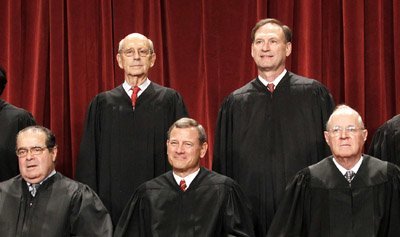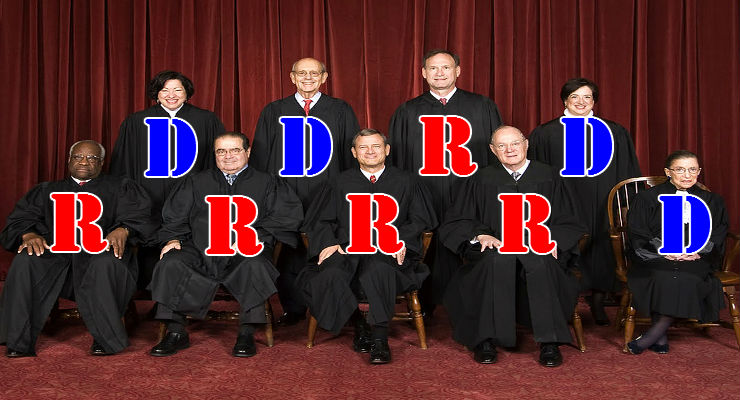
How can our politicians, made fat by selling out to the highest bidder, be anything but corruptly incompetent in running the affairs of 320,00,000 million Americans, even the world at large? After the corruption that set the stage for a collapse of our banking system and the financial crisis, we are still, years later, burdened with a Supreme Court, unelected and aged, that is perhaps itself corrupt or at the very least acting with a warped philosophy.
If you had asked Hitler, Stalin and Pol Pot what type of government is best to rule, they would say dictatorship of a strong leader. If you ask a Supreme Court justice the same question, their answer may very well not be democracy. The Supreme Court has solidified its stance in support of political corruption today in a terrible decision that will cost America perhaps everything as we proceed into the 21st century with a distorted and corrupt system for choosing leadership.
On the Corrupt Supreme Court
The worst members of the Court act under the notion that limits on the size of cash transfers to politicians violate free speech. Yet, just as arresting a murderer doesn’t violate freedom of life, liberty and happiness because a society must make laws, so does the logic of these terrible Justices fall flat on the idea that it is just for a society to have laws against corruption. The Supreme Court has been working, successfully, to legalize bribery, plain and simple.
 The US government spends over $3.5 trillion every year, but if you want to get a government contract, better not use a billion dollars to buy more efficient technology or more highly skilled workers. It is a better idea to use $900,000,000 to buy the person in government in charge of picking the contractor. Or if you are a billionaire who wants the police to stop bothering you about a pesky crime you have committed, don’t bother to buy a high price lawyer, buy a judge.
The US government spends over $3.5 trillion every year, but if you want to get a government contract, better not use a billion dollars to buy more efficient technology or more highly skilled workers. It is a better idea to use $900,000,000 to buy the person in government in charge of picking the contractor. Or if you are a billionaire who wants the police to stop bothering you about a pesky crime you have committed, don’t bother to buy a high price lawyer, buy a judge.
The only path to good government in the modern world is democracy. Ask a Burmese opposition leader. Ask a fruit seller in Sudan. Ask a Russian punk group in jail for criticizing the exercise of power. The Bill of Rights that the Supreme Court believes it is protecting is a piece of paper very similar to the ones you can find in governments as intent on increasing their citizen’s happiness as Putin’s Russia, Gaddaffi’s Libya and Saddam’s Iraq.
The problem in these dictatorships is that the piece of paper proclaiming rights does little, as the American Founding Fathers knew. It is the Constitution itself, with its series of planned elections we have now held every two years for Federal office since 1789, that protects the rights of the citizens against the abuses of power. Without elections, or with elections that are fraudulent or corrupt, there are no rights like the freedom of speech that are protected for long. They wither and die as fast as a flower cut off from its roots.
The world has tried dictatorship, to be governed by the interests of the most powerful individual. There are also now examples of democracy, including here in the US, I would still say, and across the world. Yet, the hybrid system envisioned by the Supreme Court where our elections are in fact biannual cash auctions for the right to rule is so outrageously terrible an idea as to bring to question, in this writer’s mind, the very makeup of the Supreme Court as an unelected, lifelong position. If this arrangement for the Court was supposed to reduce corruption, how can that argument be sustained if the Court rules corruption and bribery itself legal?
It is perhaps time for the Congress and the President, the real democratic wings of our government, to make drastic changes to our hiring and firing process for the Court. Can the system produce any worse of an outcome, than one that directly attacks the very election system that has given America its exceptional role in human achievement? The idea is simply outrageous and is a primary reason that election reform in the United States is the most important issue of our time.
Take a look at the New York Times article on the recent ruling:
“In a brief unsigned decision, the Supreme Court on Monday declined to have another look at its blockbuster 2010 campaign finance decision, Citizens United v. Federal Election Commission. In a 5-to-4 vote, the majority summarily reversed a decision of the Montana Supreme Court that had refused to follow the Citizens United decision”
“Even if I were to accept Citizens United,” Justice Breyer contined, “this court’s legal conclusion should not bar the Montana Supreme Court’s finding, made on the record before it, that independent expenditures by corporations did in fact lead to corruption or the appearance of corruption in Montana. Given the history and political landscape in Montana, that court concluded that the state had a compelling interest in limiting independent expenditures by corporations.”
Leave a Reply